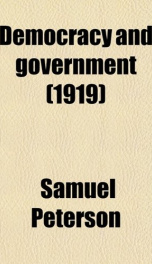democracy and government

Purchase of this book includes free trial access to www.million-books.com where you can read more than a million books for free. This is an OCR edition with typos. Excerpt from book: CHAPTER I GOVERNMENTAL FUNCTIONS A government performs three distinct functions: it adopts ideas; it carries into effect these ideas; and it decides disputes arising in connection with the carrying into effect of these ideas. Of these functions the first may, for lack of a more exact term, be called the legislative. The second and third are properly designated, respectively, the administrative, and the judicial. The term legislative, strictly speaking, refers only to the enactment of laws. This, however, is but one of the modes in which a government adopts ideas. Others are the development of legal principles by the courts, and the making of decisions by administrative officers in connection with the performance of their official duties. Such decisions may be expressed in words, or implied from conduct. Presidential orders, like those of Polk commanding General Taylor, first, to cross the Nueces River, and, afterwards, to advance to the Rio Grande, like those of Lincoln suspending the operation of the writ of habeas corpus, like those of Grant intervening with Federal troops between theconflicting State governments in Louisiana and South Carolina, or like those of Cleveland directing the sale of bonds to replenish the gold reserve in the Federal Treasury, represent, equally with Congressional statutes, the adoption of ideas by the government. In the absence of a general term to designate this governmental function of adopting ideas, no matter by whom, or in what form, or under what name they are adopted, it becomes necessary to use the word legislative for this purpose. In a very simple state ljone containing few inhabitants, and those few residing near each otherit is possible for those who have the ruling power themselves to pass all laws, issue all commands, and d...
Users who have this book
Users who want this book
What readers are saying
What do you think? Write your own comment on this book!
write a commentif you like democracy and government try:
Other books by this author
Do you want to read a book that interests you? It’s EASY!
Create an account and send a request for reading to other users on the Webpage of the book!

